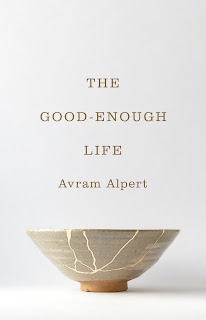 potentially catastrophic as the present. He is currently researching for a new book about what it might mean to be wise in such a world, as well working on several related creative writing projects. Beginning in May 2022, he will be a Fellow at The New Institute in Hamburg. Alpert's first book, Global Origins of the Modern Self, from Montaigne to Suzuki was published in 2019. A second book, A Partial Enlightenment: What Modern Literature and Buddhism Can Teach Us About Living Well without Perfection was published in 2021. His third book, The Good-Enough Life, is out this month.
potentially catastrophic as the present. He is currently researching for a new book about what it might mean to be wise in such a world, as well working on several related creative writing projects. Beginning in May 2022, he will be a Fellow at The New Institute in Hamburg. Alpert's first book, Global Origins of the Modern Self, from Montaigne to Suzuki was published in 2019. A second book, A Partial Enlightenment: What Modern Literature and Buddhism Can Teach Us About Living Well without Perfection was published in 2021. His third book, The Good-Enough Life, is out this month.
Alpert applied the “Page 99 Test” to The Good-Enough Life and reported the following:
On page 99 of my book, I am discussing what a “good-enough” relationship looks like. For me being good enough in a relationship does not mean just doing the bare minimum, but rather requires us to provide both goodness and enoughness (sufficient emotional support) to our friends, family, and others. Moreover, it requires us to embrace our inevitable limitations in attempting to do so. It thus requires us to abandon the allure of what I call “greatness,” or being the best at something in a competitive system. I write:Visit Avram Alpert's website.We can reimagine the types of people we want to be for each other. We can realize that being the good-enough parent or friend or lover is difficult and unparalleled in its offering. If I have been a good-enough friend or lover or son in my life, it is when I have managed to resist the various temptations of greatness. I have given what I can of myself without doing so much that I burn out. I have accepted the failings of my loved ones and been open and honest about my own limitations. I have recognized those moments when more than ordinary care is called for, and I have been able to ask for or offer extra attention without expectation of incessant increase. I have not imagined that I alone have the perfect solution to every problem we confront, but a humble position that will only be meaningful if it speaks to every one’s needs and concerns. I have encouraged those around me to find meaning and purpose in creating a good-enough world for all, not seeking to get a piece of greatness for themselves.In terms of communicating the overall message of the book, this page does, well, good-enough! It hardly captures the entirety of the argument, but it does offer a decent overview of the book’s major themes and concerns. It lays out my argument that a good-enough life is one that is rich with nuance and complexity, while avoiding the false allures of perfectionism. A reader just picking up the book here would likely be a little confused by the terminology: many of the preceding pages explain what precisely I mean by “good enough,” “a good-enough world for all,” and “greatness.” But they could probably surmise the basic themes and concerns.
The book is structured as a series of concentric circles as it passes through what a good-enough life means for individuals, relationships, society, and nature. A reader just looking at this passage might think the book only focused on relationships and was perhaps even autobiographical. While I do tell stories about myself throughout the chapters, I am certainly not the focus of the book, which offers a wide-ranging analysis of psychology, philosophy, popular culture, and evolution, among other themes.
Across its pages, The Good-Enough Life argues that we would be healthier, happier, and more relaxed if we embraced imperfection (only ever good enough) without giving up on decency (goodness) and sufficiency (enoughness) for everyone, including the natural world. I argue that this is an inspiring goal that would lead many more people to be involved in society and feel respected and rewarded for their various endeavors. Perhaps like with the Page 99 Test itself, in the good-enough life not everything works out, but it still offers us insights and pleasures that cannot be found if we are only satisfied with perfection.
--Marshal Zeringue



